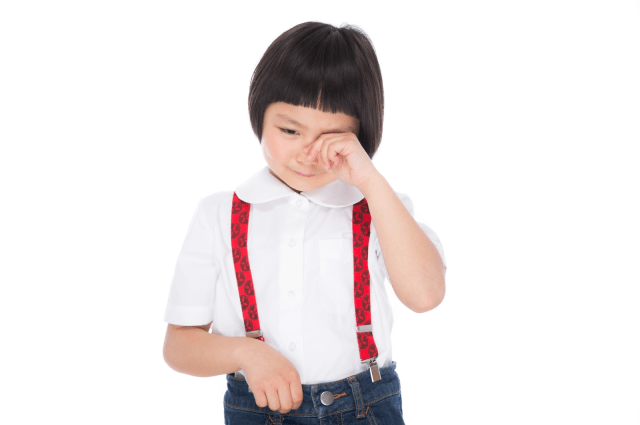
Guidelines from ministry say “any corporal punishment, no matter how light, is prohibited.”
Back in the spring, the Cabinet of Japan (which consists of the prime minister and a number of other high-ranking ministers), citing increasing child abuse statistics, introduced a bill to ban corporal punishment by parents. This week, the Ministry of Health, Labor and Welfare released its drafted guidelines for the new legislation, as put together by its Investigative Commission for the Advancement of Child-rearing without Corporal Punishment.
The Ministry’s guidelines go beyond simply prohibiting parents from smacking their kids up if they feel the young ones deserve it. The draft, which defines corporal punishment as “punishment that inflicts physical pain or discomfort,” also stresses that “any corporal punishment, no matter how light, is prohibited,” clarifying that the prohibition exists “even if the corporal punishment is enacted with the intent of disciplining the child.”
Specific examples of corporal punishment mentioned in the draft include:
● I warned my child, but they didn’t listen, so I slapped them on the cheek.
● My child hit their friend, so I hit them in the same way.
● My child stole something that belonged to someone else, so I spanked their backside.
However, even acts that ordinarily wouldn’t be construed as direct violence fall under the ministry’s criteria of “inflicting physical pain or discomfort,” as the draft would also make these scenarios illegal:
● My child teased someone, so I made them kneel on the floor Japanese seiza-style for an extended time.
● My child didn’t do their homework, so I sent them to bed without dinner.
In addition to corporal punishment, the draft, which is to be the framework of an Amended Child Abuse Prevention Act, also seeks to protect children from emotional torment from their parents. The guidelines specifically mention that it would be illegal for a frustrated parent to say to their child “I wish you’d never been born,” under the rationale that this is equivalent to denying the child’s right to exist, and thus an infringement upon the child’s personal rights.
The commission did emphasize, though, that it is not trying to eliminate parents’ right to discipline their children. Verbal admonition of the child’s conduct is still allowed, as is physical restraint in order to protect the child or others from danger. By taking corporal punishment and psychologically damaging statements out of the arsenal, however, the ministry hopes to encourage parents to better understand their children’s emotions and perspective, and to foster better communication which will lead to more positive behavior.
While the guidelines are yet to be finalized, the Amended Child Abuse Prevention Act is expected to go into effect next spring.
Source: Nihon Keizai Shimbun via Jin
Top image: Pakutaso
Insert images: Pakutaso
● Want to hear about SoraNews24’s latest articles as soon as they’re published? Follow us on Facebook and Twitter!
Follow Casey on Twitter, where he’s always baffled by old-school Japanese TV dramas where parents slap their kids, then immediately say how much they love them.


 Survey reveals 70 percent of Japanese adults believe corporal punishment is necessary
Survey reveals 70 percent of Japanese adults believe corporal punishment is necessary Japan’s prime minister wants to make it illegal for parents to hit kids when disciplining them
Japan’s prime minister wants to make it illegal for parents to hit kids when disciplining them Mother smacks child for riding bike in front of oncoming car, debate ensues【Video】
Mother smacks child for riding bike in front of oncoming car, debate ensues【Video】 Highest Starbucks in Japan set to open this spring in the Tokyo sky
Highest Starbucks in Japan set to open this spring in the Tokyo sky Saitama is home to the best strawberries in Japan that you’ve probably never even heard of
Saitama is home to the best strawberries in Japan that you’ve probably never even heard of Family Mart’s Shibuya Cat Street shop hosts first-ever rescue cat photo exhibition for Cat Day
Family Mart’s Shibuya Cat Street shop hosts first-ever rescue cat photo exhibition for Cat Day Food Fight! Mos Burger to Take on McDonald’s in the Breakfast Arena
Food Fight! Mos Burger to Take on McDonald’s in the Breakfast Arena Beautiful blue apple jam is taking the Japanese internet’s breath away!
Beautiful blue apple jam is taking the Japanese internet’s breath away! New Hello Kitty x McDonald’s Japan collaboration is like a life lesson to live by 【Video】
New Hello Kitty x McDonald’s Japan collaboration is like a life lesson to live by 【Video】 Shimane’s hidden travel sites, where you can escape the crowds and enjoy traditional Japan
Shimane’s hidden travel sites, where you can escape the crowds and enjoy traditional Japan Octopus tentacle ear plugs coming to Japanese capsule toy machines
Octopus tentacle ear plugs coming to Japanese capsule toy machines Real-life Spirited Away train line found in Japan?
Real-life Spirited Away train line found in Japan? Discover some of the best snacks in Atami, a wonderland of Japanese street food
Discover some of the best snacks in Atami, a wonderland of Japanese street food The 10 most annoying things foreign tourists do on Japanese trains, according to locals
The 10 most annoying things foreign tourists do on Japanese trains, according to locals Starbucks Japan releases new sakura goods and drinkware for cherry blossom season 2026
Starbucks Japan releases new sakura goods and drinkware for cherry blossom season 2026 Naruto and Converse team up for new line of shinobi sneakers[Photos]
Naruto and Converse team up for new line of shinobi sneakers[Photos] Is Sapporio’s Snow Festival awesome enough to be worth visiting even if you hate the snow? [Pics]
Is Sapporio’s Snow Festival awesome enough to be worth visiting even if you hate the snow? [Pics] Japan has trams that say “sorry” while they ride around town…but why?
Japan has trams that say “sorry” while they ride around town…but why? Tokyo Skytree turns pink for the cherry blossom season
Tokyo Skytree turns pink for the cherry blossom season Sakura Totoro is here to get spring started early with adorable pouches and plushies
Sakura Totoro is here to get spring started early with adorable pouches and plushies Poop is in full bloom at the Unko Museums for cherry blossom season
Poop is in full bloom at the Unko Museums for cherry blossom season Shibuya Station’s Hachiko Gate and Yamanote Line stairway locations change next month
Shibuya Station’s Hachiko Gate and Yamanote Line stairway locations change next month Japan’s new “Cunte” contact lenses aren’t pronounced like you’re probably thinking they are
Japan’s new “Cunte” contact lenses aren’t pronounced like you’re probably thinking they are Japan’s newest Shinkansen has no seats…or passengers [Video]
Japan’s newest Shinkansen has no seats…or passengers [Video] Foreigners accounting for over 80 percent of off-course skiers needing rescue in Japan’s Hokkaido
Foreigners accounting for over 80 percent of off-course skiers needing rescue in Japan’s Hokkaido Super-salty pizza sends six kids to the hospital in Japan, linguistics blamed
Super-salty pizza sends six kids to the hospital in Japan, linguistics blamed Starbucks Japan unveils new sakura Frappuccino for cherry blossom season 2026
Starbucks Japan unveils new sakura Frappuccino for cherry blossom season 2026 Foreign tourists in Japan will get free Shinkansen tickets to promote regional tourism
Foreign tourists in Japan will get free Shinkansen tickets to promote regional tourism Take a trip to Japan’s Dododo Land, the most irritating place on Earth
Take a trip to Japan’s Dododo Land, the most irritating place on Earth Is China’s don’t-go-to-Japan warning affecting the lines at a popular Tokyo gyukatsu restaurant?
Is China’s don’t-go-to-Japan warning affecting the lines at a popular Tokyo gyukatsu restaurant? Survey asks foreign tourists what bothered them in Japan, more than half gave same answer
Survey asks foreign tourists what bothered them in Japan, more than half gave same answer Japan’s human washing machines will go on sale to general public, demos to be held in Tokyo
Japan’s human washing machines will go on sale to general public, demos to be held in Tokyo Starbucks Japan releases new drinkware and goods for Valentine’s Day
Starbucks Japan releases new drinkware and goods for Valentine’s Day We deeply regret going into this tunnel on our walk in the mountains of Japan
We deeply regret going into this tunnel on our walk in the mountains of Japan Studio Ghibli releases Kodama forest spirits from Princess Mononoke to light up your home
Studio Ghibli releases Kodama forest spirits from Princess Mononoke to light up your home Major Japanese hotel chain says reservations via overseas booking sites may not be valid
Major Japanese hotel chain says reservations via overseas booking sites may not be valid Put sesame oil in your coffee? Japanese maker says it’s the best way to start your day【Taste test】
Put sesame oil in your coffee? Japanese maker says it’s the best way to start your day【Taste test】 No more using real katana for tourism activities, Japan’s National Police Agency says
No more using real katana for tourism activities, Japan’s National Police Agency says